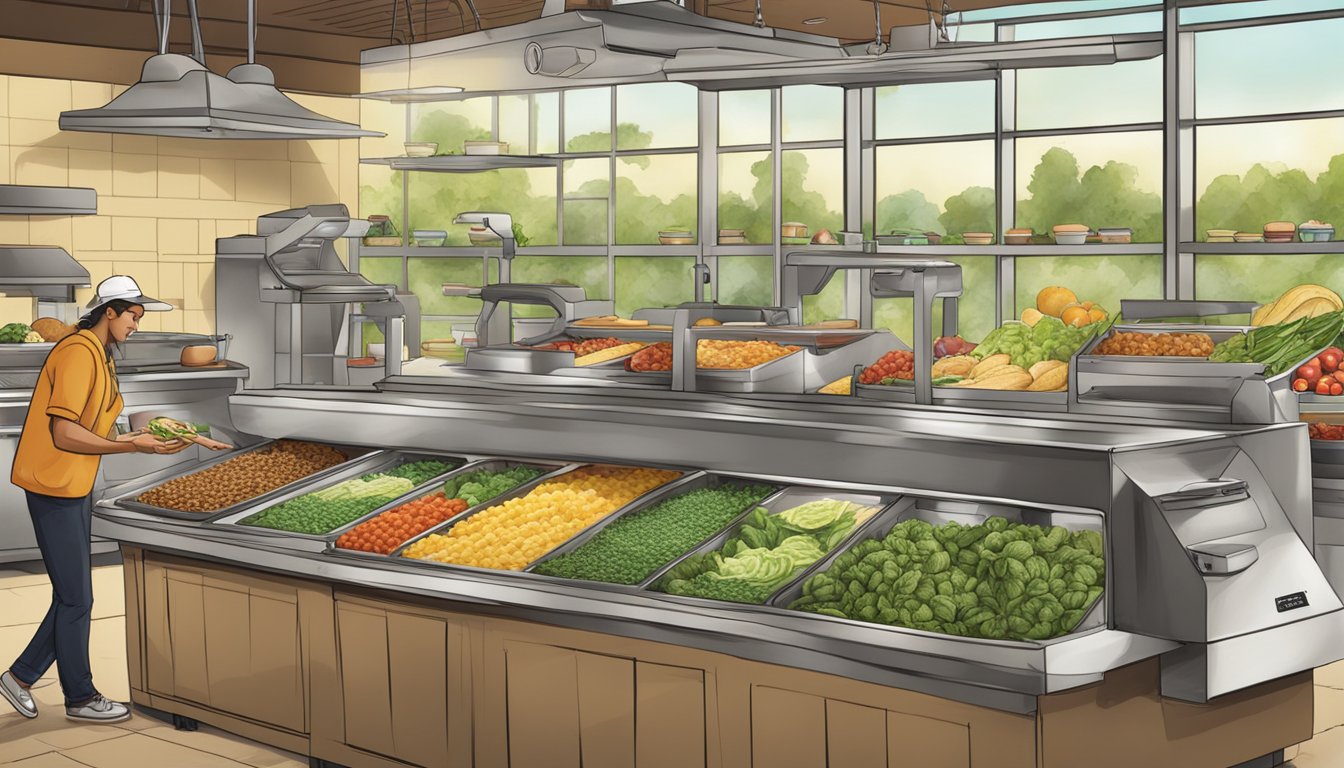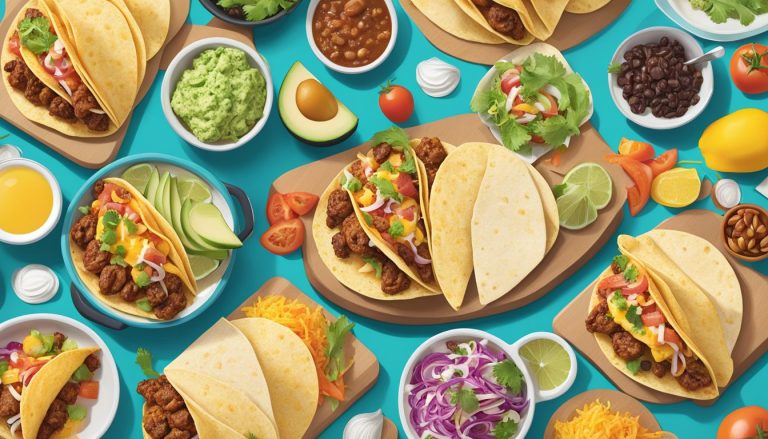Taco Cabana, a popular Tex-Mex chain, takes pride in sourcing high-quality ingredients for its menu offerings. The restaurant emphasizes fresh, authentic flavors that capture the essence of Tex-Mex cuisine. Taco Cabana sources its ingredients from a network of trusted suppliers, prioritizing quality and consistency across its locations.
The chain’s commitment to freshness is evident in its approach to ingredient procurement. Taco Cabana’s kitchens prepare many items from scratch daily, including tortillas, salsas, and marinades. This dedication to house-made components ensures that customers experience the authentic taste of Tex-Mex dishes.
While specific details about Taco Cabana’s ingredient sourcing are not publicly available, the chain’s menu reflects a focus on traditional Tex-Mex staples. From seasoned meats to fresh produce for toppings like pico de gallo, Taco Cabana aims to deliver flavors that resonate with fans of this beloved cuisine.
The History of Taco Cabana

Taco Cabana’s journey from a single taco stand to a beloved Tex-Mex chain spans over four decades. The company’s history is marked by innovation, legal battles, and changing ownership.
Founding and Growth
Felix Stehling founded Taco Cabana in September 1978 in San Antonio, Texas. The first restaurant opened at the corner of San Pedro and Hildebrand Avenue, transforming a vacant Dairy Queen into a taco stand. Stehling’s initial goal was to provide parking for his bar across the street, the Crystal Pistol.
The restaurant’s open-air design became a signature feature. Taco Cabana pioneered the concept of “patio cafes” with semi-enclosed dining areas decorated in festive Mexican themes. This unique approach helped differentiate the brand in the competitive fast-food market.
By 1992, Taco Cabana had expanded to 17 locations and went public with its first stock offering. The company’s growth continued steadily, eventually reaching over 100 restaurants across Texas, Oklahoma, and New Mexico.
Key Figures of Taco Cabana
Felix Stehling, the founder, played a crucial role in establishing Taco Cabana’s identity and initial success. His vision for a Tex-Mex restaurant with fresh ingredients and a welcoming atmosphere set the foundation for the brand.
Ulyses Camacho served as President and Chief Operating Officer, contributing to the company’s operational excellence and expansion strategies. His leadership helped maintain Taco Cabana’s commitment to quality and customer satisfaction.
Armando Flores, as Senior Director of Procurement and Supply Chain, ensured the consistent supply of ingredients across the growing network of restaurants. His role was vital in maintaining food quality and managing costs.
Mergers and Ownership
Taco Cabana’s ownership has changed hands several times throughout its history. In 1992, the company faced a significant legal battle with Two Pesos, a rival restaurant chain. The case reached the Supreme Court, which ruled in Taco Cabana’s favor, awarding $3.7 million in damages.
YTC Enterprises acquired Taco Cabana in 2000, marking a new chapter for the company. Later, Carrols Restaurant Group took ownership of the chain.
In 2012, Taco Cabana became part of Fiesta Restaurant Group, separating it from Carrols. This move positioned Taco Cabana alongside other fast-casual brands, allowing for focused growth and development strategies.
Taco Cabana’s Menu Offerings

Taco Cabana offers a diverse menu featuring classic Tex-Mex dishes, breakfast specialties, and a variety of beverages. Their offerings showcase bold flavors and fresh ingredients across a range of traditional and innovative menu items.
Signature Tex-Mex Dishes
Taco Cabana’s menu centers around classic Tex-Mex favorites. Tacos come in various styles, including soft tacos with steak, chicken, or mixed fajita fillings. The beef taco, made with seasoned ground beef, is a popular choice.
Nachos, quesadillas, and burritos round out the core offerings. The Cabana Bowl provides a hearty option, featuring rice, beans, lettuce, pico de gallo, cheese, and sour cream in a crispy tortilla shell.
For those seeking lighter fare, shredded chicken tacos offer a leaner option at 280 calories. Enchiladas and flautas are also available for customers craving traditional Tex-Mex flavors.
Taco Cabana takes pride in its selection of salsas and sauces, which complement the menu items and add extra zest to meals.
Breakfast Specialties
Taco Cabana caters to early risers with a range of breakfast options. Breakfast tacos are a staple, offering a portable and satisfying morning meal.
The breakfast plate provides a heartier start to the day. While specific details aren’t provided in the search results, it likely includes classic Mexican breakfast elements such as eggs, beans, and tortillas.
These breakfast offerings allow Taco Cabana to serve customers throughout the day, expanding their appeal beyond lunch and dinner crowds.
Beverage Selection
Taco Cabana complements its food menu with a variety of drink options. Margaritas stand out as a signature offering, providing a refreshing alcoholic option that pairs well with Tex-Mex cuisine.
The restaurant also serves other alcoholic beverages, though specific details aren’t provided in the search results. Non-alcoholic options are likely available to cater to all customers.
Taco Cabana’s beverage selection aims to enhance the dining experience and provide choices that complement the flavors of their food offerings.
Ingredient Sourcing and Supply Chain

Taco Cabana prioritizes strategic procurement, strong supplier relationships, and a commitment to quality in its ingredient sourcing and supply chain management. These elements work together to ensure the restaurant can consistently deliver fresh, authentic Mexican cuisine to its customers.
Procurement Strategies
Taco Cabana employs a multi-faceted approach to ingredient procurement. The company focuses on sourcing high-quality, fresh ingredients that align with its made-from-scratch cooking philosophy. Armando Flores, Senior Director of Procurement and Supply Chain, oversees this critical process.
Taco Cabana’s procurement team analyzes market trends and supplier capabilities to secure the best ingredients at competitive prices. They utilize forecasting tools to anticipate demand and optimize inventory levels.
The company also emphasizes local sourcing when possible, partnering with regional farmers and producers to obtain fresh produce and meats. This strategy helps support local economies and reduce transportation costs.
Partnerships and Supplier Relations
Strong supplier relationships form the backbone of Taco Cabana’s ingredient sourcing strategy. The company cultivates long-term partnerships with reliable suppliers who share their commitment to quality and food safety.
Taco Cabana regularly communicates with suppliers to ensure alignment on quality standards, delivery schedules, and product specifications. They conduct periodic supplier audits and performance reviews to maintain high standards.
The company also collaborates with suppliers on product innovation, working together to develop new ingredients or improve existing ones. This collaborative approach helps Taco Cabana stay ahead of culinary trends and meet evolving customer preferences.
Quality and Freshness
Taco Cabana’s commitment to quality and freshness is evident in its rigorous ingredient standards. The company has established strict quality control measures throughout its supply chain.
Ingredients undergo thorough inspection upon arrival at Taco Cabana locations. Staff are trained to identify and reject subpar products. The company’s made-from-scratch cooking approach ensures that ingredients are prepared fresh daily in each restaurant.
Taco Cabana also invests in proper storage and handling equipment to maintain ingredient freshness. This includes temperature-controlled storage areas and specialized packaging for sensitive items.
Regular quality audits and taste tests help maintain consistency across all locations. The company continuously refines its processes to uphold its reputation for serving fresh, flavorful Mexican cuisine.
Culinary Techniques and Innovations

Taco Cabana blends traditional Tex-Mex cooking methods with modern innovations to create its signature flavors. The restaurant emphasizes freshness and authenticity in its menu offerings.
Open-Display Cooking
Taco Cabana utilizes open-display cooking techniques to showcase its food preparation process. Customers can watch as skilled cooks craft their meals in real-time. This transparent approach builds trust and highlights the freshness of ingredients.
The open kitchen design allows diners to see tortillas being made from scratch. Cooks press and grill flour tortillas on-site, ensuring optimal texture and taste. Guests can also observe the preparation of signature items like guacamole and pico de gallo.
This method not only engages customers but also maintains high standards of cleanliness and quality control.
Handcrafted Tex-Mex Specialties
Taco Cabana takes pride in its handcrafted Tex-Mex specialties. The restaurant’s cooks prepare many items from scratch daily. This includes their popular made-from-scratch salsas, which range from mild to spicy.
Guacamole is another handcrafted item, made fresh throughout the day. Cooks carefully select ripe avocados and blend them with other fresh ingredients. The restaurant’s commitment to handcrafted specialties extends to its meat preparations as well.
Marinated meats are grilled to order, ensuring optimal flavor and juiciness. This attention to detail sets Taco Cabana apart in the fast-casual Tex-Mex market.
Emphasis on Innovation
Taco Cabana continually innovates its menu to keep up with changing tastes and trends. The restaurant regularly introduces new items that blend traditional Tex-Mex flavors with contemporary culinary concepts.
Innovation extends to the restaurant’s cooking techniques as well. Taco Cabana invests in modern kitchen equipment to improve efficiency and consistency. This allows them to maintain quality while serving a high volume of customers.
The company also explores new flavor combinations and ingredient pairings. Recent innovations include plant-based protein options and health-conscious menu items. These efforts help Taco Cabana stay relevant in a competitive market.
Taco Cabana’s Culture and Customer Engagement

Taco Cabana fosters a vibrant culture centered on authentic Tex-Mex cuisine and community connection. The restaurant chain emphasizes customer satisfaction through innovative marketing, personalized service, and franchise growth opportunities.
Marketing and Brand Positioning
Taco Cabana’s marketing strategy focuses on its Tex-Mex roots and fresh, high-quality ingredients. The brand leverages social media platforms to showcase its colorful menu items and engage with customers.
Seasonal promotions, like the popular “MargaritaPalooza,” highlight Taco Cabana’s commitment to fun and flavorful offerings. This event features 12 margarita flavors at $2 each, attracting younger customers and boosting sales.
The restaurant chain’s branding emphasizes its Texas heritage and commitment to authentic recipes. Bright, inviting restaurant designs reflect the lively Tex-Mex culture and create a welcoming atmosphere for diners.
Customer Experience and Service
Taco Cabana prioritizes consistent food quality and service across its 144 locations. The company invests in staff training to ensure uniform preparation methods and customer interactions.
The chain’s loyalty rewards program incentivizes repeat visits and allows customers to earn points for free menu items. Mobile ordering and drive-thru options cater to convenience-seeking patrons.
Taco Cabana actively seeks customer feedback through surveys and social media. This input helps the company refine its menu offerings and improve service standards.
Franchise Opportunities
Taco Cabana offers franchise opportunities to entrepreneurs interested in joining the Tex-Mex restaurant industry. The company provides comprehensive training and support to new franchisees.
Franchisees benefit from Taco Cabana’s established brand recognition and proven business model. The chain’s expansion strategy focuses on growth within Texas and neighboring states.
Potential franchisees undergo a rigorous selection process to ensure alignment with Taco Cabana’s values and quality standards. The company assists with site selection, restaurant design, and ongoing operational support.
Business Strategy and Expansion

Taco Cabana is pursuing an ambitious growth strategy focused on franchising and expanding its Tex-Mex cuisine offerings. The company aims to leverage its strong brand recognition in Texas to fuel national expansion while maintaining its commitment to fresh ingredients and quality.
Strategic Growth Plans
Taco Cabana recently announced plans to restart its franchising program. This move marks a significant shift in the company’s expansion strategy. The chain has brought on franchising expert John Ramsay to lead development efforts. Ramsay’s experience with brands like Noodles & Company and Jack in the Box is expected to accelerate growth.
Taco Cabana is targeting strategic partners to open new locations across the United States. The company believes franchising will allow for faster expansion while maintaining brand standards. Management is focused on finding franchisees who will adhere to Taco Cabana’s fresh ingredient model.
Financial Performance
While specific financial details are limited, Taco Cabana’s performance has shown resilience. The chain’s margarita offerings helped sustain business during the COVID-19 pandemic. This success with alcohol sales has encouraged the company to further emphasize its bar menu.
Taco Cabana remains a privately held company. There are currently no public plans for a stock offering. The chain’s financial strategy appears centered on using franchising revenue to fund growth rather than seeking outside investment.
Competitive Landscape
Taco Cabana operates in the competitive fast-casual Mexican food segment. The chain differentiates itself through its Tex-Mex cuisine and fresh ingredient focus. This positions Taco Cabana between traditional fast food chains and more upscale Mexican restaurants.
Previous expansion attempts into states like Colorado and Georgia struggled due to deviations from the core business model. Taco Cabana is now emphasizing strict adherence to its fresh ingredients strategy as it expands. The company faces challenges from both national chains and local Tex-Mex restaurants as it enters new markets.
Sustainability and Community Impact

Taco Cabana prioritizes sustainability and community engagement through targeted initiatives. The company focuses on reducing its environmental footprint while supporting local communities.
Environmental Initiatives
Taco Cabana implements eco-friendly practices in its restaurants. The company uses energy-efficient lighting and appliances to reduce electricity consumption. Water-saving fixtures help conserve resources in their kitchens and restrooms.
Packaging is another area of focus. Taco Cabana has introduced compostable and recyclable containers for many menu items. This shift aims to minimize waste sent to landfills.
The restaurant chain also works with suppliers to source ingredients responsibly. They prioritize partnerships with farmers who use sustainable agricultural practices.
Community Engagement and Support
Taco Cabana actively participates in local community events and fundraisers. The company sponsors youth sports teams and educational programs in areas where its restaurants operate.
Food donation is a key initiative. Taco Cabana partners with local food banks to provide meals to those in need. This program helps reduce food waste while supporting vulnerable populations.
The restaurant chain also creates job opportunities in the communities it serves. They offer training programs and career advancement paths for employees.
Taco Cabana engages customers in their community efforts through in-store promotions and social media campaigns. These initiatives raise awareness and encourage customer participation in local causes.




